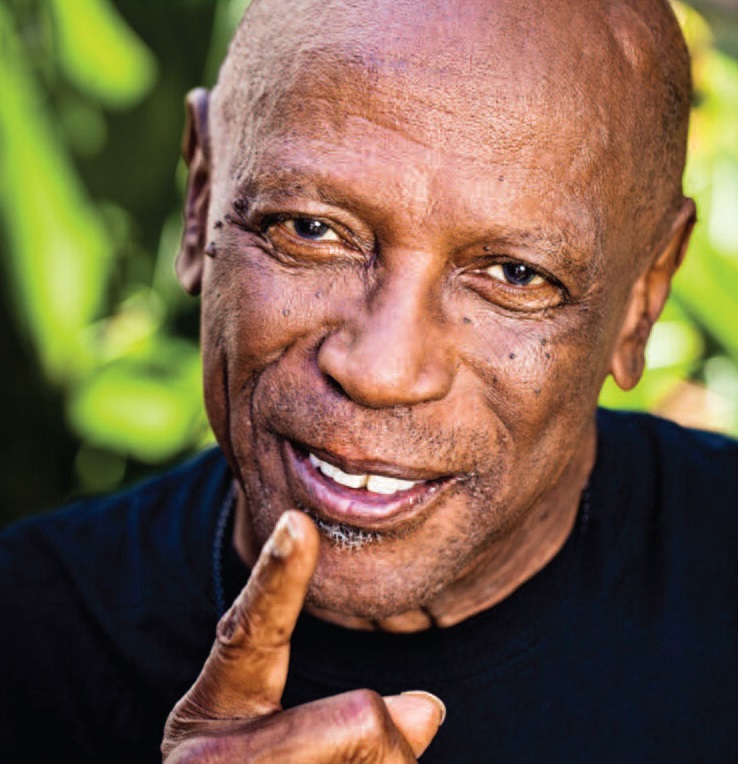Lou Gossett may not be executing roundhouse kicks anymore, but his power within the motion picture industry has hardly diminished. During the most recent Academy Awards, the camera found him again and again. Gossett, you may recall, was the first African American actor to take home a Best Supporting Oscar (for An Officer and a Gentleman). He also happens to be an influential member of the Academy of Motion Picture Arts and Sciences, as well as a hallowed figure in the greater Hollywood community, which recently endured some high-profile criticism for its lack of diversity. As Editor at Large Tracey Smith discovered, Louis Gossett, Jr. is all about diversity. In fact, it has a lot to do with his unique ability to portray forceful, independent characters who command a story or a scene…and then slowly, grudgingly reveal their vulnerabilities.
EDGE: Are you drawn to forceful roles because they are written this way, or is it a dimension you like to bring to your characters?
LG: I’m not sure. Some of them now are, of course, designed that way for me. I could always play a variety of strong characters. I’d shave my head and play anything I wanted! But I also played Anwar Sadat, which was astounding, and I did Enemy Mine, which was a cult film. So the choices of parts were actually quite diverse.
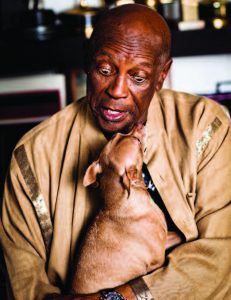
Photo by David Walden
EDGE: Where do you think that comes from?
LG: It came out of Coney Island—it came out of my childhood [laughs]. I was taught as a child how to live successfully with others, especially those that differ.
EDGE: What was your Brooklyn neighborhood like?
LG: It was a diverse camaraderie coming out of the mud of the Great Depression. I was not born in a “black” neighborhood. I was born into a “society” that was happening after the resurrection of mankind following the Depression. There was a lot of stuff occurring, including a fear that the Communists were taking over—which they were not. But as a result, the intellectual cream of the crop was being run out of higher education. Dr. William Jansen, the New York City Schools Chancellor, moved them all out to the “boondocks” of Brooklyn, where they started an incredible renaissance of learning and art. I had the benefit of a Latin teacher in third grade! My classmates were the children of doctors, dentists, lawyers and schoolteachers. I had my heroes: I saw Jackie Robinson become a Dodger, Ralph Bunche at the United Nations, Walter White and the NAACP. Other kids had theirs—Superman, Hopalong Cassidy. But during my childhood we had no thought of separation because of race. If I didn’t eat dinner at home, I might go to my next-door neighbor’s, where gefilte fish was on the table. Or down the block for corned beef and cabbage. And long before there were cell phones, there were old ladies in the windows making sure the neighborhood was straight.
EDGE: So that experience prepared you to become an actor, to slip inside a character? Is that how you won your first role, in Take a Giant Step?
LG: Yes. I was 17 and had never seen a Broadway play. One day, my English teacher, who read the trades, said, “Hey, Louie. I know you’ve never acted before, but I like the way you read the stuff in class. They’re looking for a kid about your age to play a lead in a Broadway show. Tell your mother to bring you down.”
EDGE: You were very active on the stage during the 1950s and 1960s. But movie and television roles must have been harder to come by. What were some of the challenges you faced in Hollywood and, also, how did you involve yourself in the civil rights effort as you became more well known?
LG: There was something wrong to me about marching for peace, so I did it by personal example—through the roles that I chose, and triumphs in the theater and movies. I hoped it would impress upon people that there was no such thing as “impossible” for the young. In terms of challenges, yes I was challenged a great deal. I was told by the casting people—either verbally or subtly—“I don’t care how many awards you win, you’re still black, you still have to prove yourself.” The limitations I came up against forced me to be as good as I could possibly be.
EDGE: What was your professional life like at that time?
LG: I got a guitar and played folk music for a while in between jobs, and I survived through television. Television was very good to me. I lived well in Malibu, down the street from Michael Landon. Sometimes a guest role was a one- and-done because of the difficulty due to discrimination. But I was able to make some alliances. My first TV movie was Companions in Nightmare, in 1968. Melvyn Douglas played a psychiatrist with a murderer in his group therapy. The cast included Gig Young, who won the Emmy, Ann Baxter, William Redfield, Leslie Nielsen, Patrick O’Neil, and me. These were great actors who came from New York, from Broadway. And they were wonderful to me. I wouldn’t be sitting here if it weren’t for them.
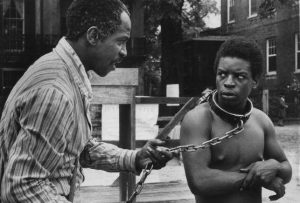
ABC Television
EDGE: In 1977, you won an Emmy for your role in Roots. What happened to your professional life after that?
LG: It exploded! I didn’t know that everybody would stop what they were doing to watch the series. That was a pleasant surprise. I was working a great deal already, though. Around that time, I did an episode of Little House on the Prairie, I did The Rockford Files with Jimmy Garner, and an ABC Movie of the Week. And a wonderful renaissance was happening in television in the 1970s with all that came out of Norman Lear’s consciousness, like All In the Family, The Jeffersons, and Good Times, as well as later shows, like Benson.
EDGE: How did you prepare for an intense, emotional role like Fiddler in Roots?
LG: I did very little preparation.
EDGE: Why?
LG: Because it was in my roots. Fiddler was like my grandparents. Roots was actually very emotional on all of our parts. My best friend at the time was Vic Morrow, who played the guy in charge of the slaves. There was a scene where he ordered a beating to make LeVar Burton’s character say that his name isn’t Kunta Kinte anymore, its Toby. Vic came up to me in advance and apologized. “Lou, I have to do this scene fully.” He did it so fully that I was transformed into saying, “Kunta Kinte—that’s what your name is. That’s what you’ll always be. There’s going to be another day, you hear me?” And we are in another day. Alex Haley told that story quite frequently.
EDGE: You’re perhaps best known for your Oscar-winning role in An Officer and a Gentleman. What are the “hard-to-find” Lou Gossett performances that are not as well known?
LG: A number of television movies. There’s Goodbye Miss Fourth of July, Lawman without a Gun, Carolina Skeletons, and two pilots that I did, To Dance with Olivia, and The Color of Love: Jacey’s Story.
EDGE: You mentioned Enemy Mine earlier, in which you played an alien. That was an interesting choice for a number of reasons. Did the fact you would be physically unrecognizable make the role more appealing or less appealing?
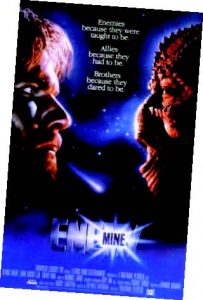
Kings Road Entertainment/SLM Production Group
LG: Everybody turned that role down! You couldn’t see the actor’s face or the eyes. It was a challenge, an artistic challenge, to be able to make a performance credible without the natural use of your eyes, face or body—on top of the five or six hours of make-up. Plus, we had to create a species from scratch, with a philosophy and a language that doesn’t exist, and then get into the hearts and minds of an audience. It was a tough artistic stretch, but a great, great story.
EDGE: Have you always enjoyed testing yourself?
LG: Oh yeah! You’ve got to raise the artistic bar!
EDGE: What do you like about it?
LG: That you never lose your concentration. That’s what’s incredible—you’ve got to keep on trying, you’ve got to dig it out, and deal with all the stuff that gets in your way. The instrument for the actor is himself, his body, his thinking, his emotions, his physical stuff, spiritual stuff. He’s got to be prepared to develop any character without any personal crutches.
EDGE: Our readers were big Boardwalk Empire fans. You had a memorable part in Season 4 as Oscar Boneau, a mentor, if you will, to Michael K. Williams’s character, Chalky White.
LG: It was a great opportunity to play that character because Oscar was Grandpa. A grandfather is in a position of mentorship, what I call selfless service. All the sun comes out when you do that, regardless of whatever you’ve gone through in your life. After that episode aired, people came out of the woodwork, especially young actors. They liked it a lot. It was never nominated or anything like that. But I don’t go for the nominations. I go for what gets the message across.
EDGE: Speaking of nominations and awards, did you get a lot of questions about the Academy Awards this year?
LG: Yeah. But let’s back it up against the bigger picture. Once you’re in the Academy you’re not a black person in the Academy. You’re a member. Black movies, Jewish movies, gay movies, white movies, it does not matter; we are one bunch of people there. The best thing about our organization is that, when they know they’ve made a mistake, they overcompensate and never make it again.
EDGE: In the midst of the current discussion, does your golden statue mean more to you, less to you…?
LG: It’s a reminder—a reminder that you can go as far as you can imagine yourself going, if you prepare yourself properly. For kids, that message is simple: If you shoot for a ten and you get a five, you have five more than you started out with.
EDGE: What else have you learned on this remarkable journey?
LG: Longevity has been a good teacher. I believe that if there is fear, there is no faith, especially when times are hard. I wrote a short poem on this subject:
Things will happen as they will.
The world will never be stronger than faith
Although some of our wildest doubt may sometimes bother our dreams.
Love when it comes, it never comes too late.
I want to be a humble, teachable, moldable part of society and to get myself in a receptive position—spiritually, emotionally, physically—because God wants me to know myself and to conduct myself accordingly, one day at a time. To young people, I say be responsible for yourself and then you will become ambassadors of peace, and miracles can happen.
EDGE: Paul Robeson once said, “As an artist I come to sing, but as a citizen I will always speak for peace, and no one can silence me in this.” What do those words mean to you?
LG: Back in the old days, if you had been a minority and said this, you would’ve been branded a rebe
l. Today, you’re a responsible citizen. The sooner we get to that one people, one nation, one world, one consciousness, the better we’re going to be. We’re not there yet…but thank God we’re going in the right direction.
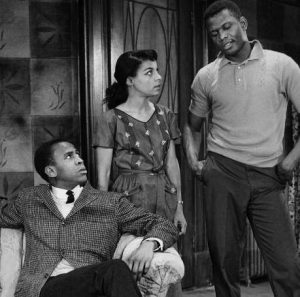
A Raisin In the Sun/Belasco Theatre
THE GOSSETT FILE
Louis Cameron Gossett, Jr.
Born: May 27, 1936 (Brooklyn, NY)
First Broadway Play: Take a Giant Step (1953)
First TV Appearance: The Big Story (1958)
First Hollywood Film: A Raisin In the Sun (1961) Outstanding Lead Actor Emmy: Roots (1977)
Best Supporting Oscar: An Officer and a Gentleman (1982)
Best Supporting Golden Globe: An Officer and a Gentleman (1982)
Best Supporting Golden Globe: The Josephine Baker Story (1991)
Primetime Emmy Nominations: 7
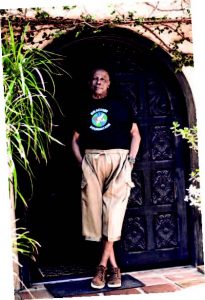
David Walden
Can You Hum a Few Bars?
During the 1960s, Lou co-wrote the popular war protest song “Handsome Johnny” with Richie Havens.
Did You Know?
Lou’s nephew, Robert Gossett, co-stars with Kyra Sedgwick and J.K. Simmons on the TNT series The Closer.
Eracism
Gossett is the founder, president and chairman of the Eracism Foundation. Its mission is to contribute to the creation of a society where racism does not exist. He defines Eracism as the removal from existence of the belief that one race, one culture, one people is superior to another. For more information or to get involved, log onto eracismfoundation.org.

